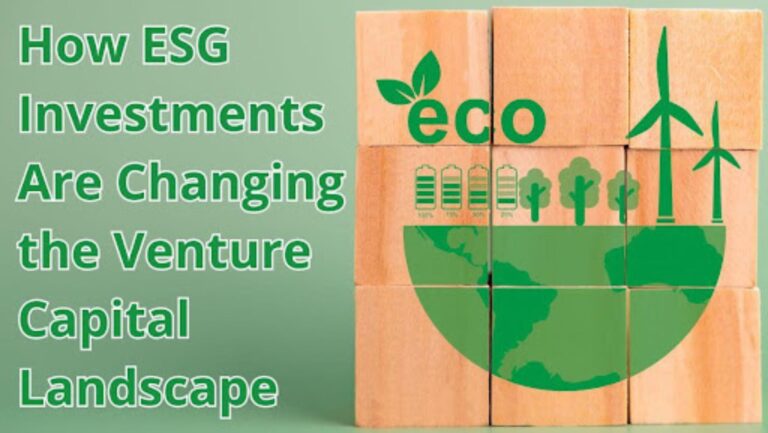Venture capital is undergoing a quiet revolution. For decades, the primary goal of VC firms was simple: generate outsized financial returns by backing high-growth startups. But in recent years, a new investment lens has emerged that considers not just profit but also the broader impact a company has on people and the planet. This is the rise of ESG investing.
ESG, short for Environmental, Social, and Governance, has rapidly moved from the fringes of finance into the mainstream. Limited partners (LPs), including pension funds, sovereign wealth funds, and family offices, are now placing greater emphasis on sustainable investment strategies. As a result, venture capital firms are under increasing pressure to assess how startups measure up on ESG criteria, whether that’s reducing carbon emissions, fostering workplace diversity, or ensuring transparent governance.
This shift toward sustainable investing is not just a trend; it’s a fundamental rethinking of what constitutes long-term value. For the venture capital ecosystem, it signals a transformation in how deals are sourced, evaluated, and scaled.
How ESG Factors Influence VC Investment Decisions
As ESG principles gain prominence in global finance, they are reshaping how venture capital firms evaluate startups. Investors are no longer solely focused on rapid growth potential; they are also assessing how that growth is achieved and the broader impact it has. Environmental, social, and governance (ESG) factors have become critical indicators of long-term value and operational integrity.
Environmentally, startups that demonstrate a commitment to sustainability—such as adopting clean energy solutions, reducing emissions, or building low-carbon supply chains—are viewed more favorably. These companies are seen as better aligned with future market expectations and regulatory standards.
Social factors, including workplace diversity, employee well-being, and ethical sourcing, are also influencing venture capital decisions. Founders who prioritize inclusive hiring and fair labor practices often foster stronger cultures and attract talent that drives innovation, positioning their companies for sustainable growth.
Governance is equally critical. Venture capitalists seek assurance that startups have robust oversight, transparent decision-making processes, and compliance systems in place. Effective governance reduces operational risk and demonstrates a startup’s maturity and potential to scale responsibly.
One firm exemplifying this approach is TNBAura, a Singapore-based venture capital firm. TNBAura integrates ESG metrics into its investment frameworks, backing visionary founders across Southeast Asia who not only lead in innovation but also build with purpose. Their focus on responsible governance and long-term impact is embedded in their investment strategy from the outset.
ESG & Financial Performance: Myth or Reality?
The idea that ESG-focused startups are a financial compromise is steadily being disproven by real-world data. In fact, an increasing number of studies and investment reports suggest the opposite: startups that embed ESG principles into their business model often outperform their peers in the long run—both in terms of resilience and returns.
Research from global consulting firms and asset managers has shown a positive correlation between ESG integration and financial performance. ESG-backed startups are often more efficient with resource use, better at risk management, and more agile in responding to regulatory or market changes. These qualities don’t just reduce downside exposure—they can directly contribute to sustainable revenue growth.
For example, companies focused on clean technology or sustainable materials have seen a surge in investor interest, with several outperforming traditional counterparts even during market downturns. Similarly, startups with diverse leadership teams and strong governance structures tend to make more balanced decisions and attract more customer loyalty—two factors that translate into long-term financial value.

In short, the belief that ESG principles dilute performance is proving to be a myth. When implemented with intent, ESG can serve as a multiplier, enhancing brand value, reducing risk, and delivering solid financial outcomes.
Challenges VCs Face in ESG Investing
As ESG becomes a more central part of venture capital strategy, investors are also encountering new complexities. Two of the biggest challenges are:
1. Measuring ESG Impact
Unlike public companies, startups rarely have standardized ESG reporting frameworks. Early-stage companies may not track carbon emissions, diversity metrics, or governance practices in a consistent or quantifiable way. This lack of uniform data makes it difficult for VCs to assess performance, compare companies, or report progress to their limited partners. Many investors are left to rely on custom evaluation tools or qualitative judgments, which can vary across portfolios and introduce bias or uncertainty.
2. Avoiding Greenwashing
As ESG gains popularity, some startups may exaggerate or misrepresent their sustainability efforts to appeal to values-driven investors. This practice, known as greenwashing, can mislead stakeholders and damage a VC firm’s credibility. Spotting greenwashing isn’t always easy—especially when claims are broad or lack third-party verification. VCs must dig deeper during due diligence, asking for evidence of real actions (e.g., sustainability goals, internal policies, measurable outcomes) rather than relying on surface-level branding or buzzwords.
To manage these challenges, some venture firms are now building internal ESG teams, adopting third-party frameworks, or working closely with founders to co-develop impact metrics. These steps help ensure ESG isn’t just a label but a meaningful part of how startups operate and grow.
The Future of ESG in Venture Capital
The integration of Environmental, Social, and Governance (ESG) principles into venture capital (VC) is poised to become more structured and influential in the coming years. This evolution is driven by a combination of regulatory developments and shifting investor sentiments.
Policy Changes
Globally, regulatory bodies are implementing stricter ESG disclosure requirements. For instance, the European Union’s Sustainable Finance Disclosure Regulation (SFDR) mandates that investment firms provide detailed information on how they integrate ESG factors into their processes. Similarly, the U.S. Securities and Exchange Commission (SEC) has proposed rules to enhance ESG disclosures among funds. These regulations aim to standardize ESG metrics, enabling investors to make informed decisions and reducing the risk of greenwashing.
Investor Sentiment Trends

Investor interest in ESG remains strong, albeit with nuanced shifts. According to the US SIF Foundation’s 2024 Trends Report, 73% of respondents expect the sustainable investment market to grow significantly in the next one to two years, driven by client demand and regulatory evolution. However, there is also a growing demand for transparency and measurable impact, with investors seeking verifiable ESG performance indicators to guide their decisions.
Implications for Venture Capital
For VC firms, these developments underscore the importance of embedding ESG considerations into their investment strategies. This includes establishing clear ESG criteria during due diligence, setting measurable impact goals, and regularly reporting on ESG performance. By doing so, VCs can align with regulatory expectations and meet the evolving preferences of investors who prioritize sustainability and ethical governance.
Conclusion
ESG investing is no longer a fringe consideration in venture capital—it’s becoming a defining feature of how firms evaluate risk, support growth, and deliver long-term value. As pressure mounts from limited partners, regulators, and a more conscious market, VCs are rethinking what success looks like beyond financial returns.
Startups that embed sustainability, inclusivity, and strong governance from the outset are better positioned to attract funding, scale responsibly, and build lasting impact. While challenges like measuring ESG performance and avoiding greenwashing remain, they are increasingly being addressed through better tools, clearer frameworks, and stronger investor-founder alignment.
For venture capital firms, the path forward is clear. ESG isn’t a trend to follow but a foundation to build on.




